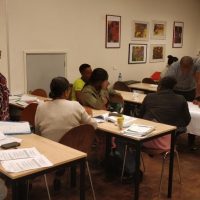 Suriname is a country that is well-known in The Netherlands because it was a Dutch colony and there are many Surinamese who live in The Netherlands, mostly people with Hindustani background, but also creoles (people of African and European descent) and Surinamese with Indonesian roots. I taught at a public administration programme, and the composition of students was such that ministry workers prevailed, as well as those in middle age — between 35 and 45 years old. The setting of teaching is rather curious, I stayed in a posh hotel Torarica Royal where presidents stay when they travel to Suriname, during my stay Evo Moralez came to spend one day in the hotel, and Lavrov, the Russian foreign minister stayed there on his visit in late July. I flew business class with the Surinam Airways and there was a driver to take me to and from the institute. An experience of a privileged foreigner landing in a colonial/post-colonial country would be one way to describe it.
Suriname is a country that is well-known in The Netherlands because it was a Dutch colony and there are many Surinamese who live in The Netherlands, mostly people with Hindustani background, but also creoles (people of African and European descent) and Surinamese with Indonesian roots. I taught at a public administration programme, and the composition of students was such that ministry workers prevailed, as well as those in middle age — between 35 and 45 years old. The setting of teaching is rather curious, I stayed in a posh hotel Torarica Royal where presidents stay when they travel to Suriname, during my stay Evo Moralez came to spend one day in the hotel, and Lavrov, the Russian foreign minister stayed there on his visit in late July. I flew business class with the Surinam Airways and there was a driver to take me to and from the institute. An experience of a privileged foreigner landing in a colonial/post-colonial country would be one way to describe it.
The best part of the trip was teaching of course, and interaction with students. But this was not all. I was relatively well-prepared for the trip with my little book on Suriname from the Den Haag public library and the authoritative volume on history of Suriname by Hans Buddingh, so I knew about some of the key moments of the recent history of Suriname, such as the controversy around the sitting president Bouterse, the economic performance of the country and the gold rush. It gave me some basis in experiencing the country, especially given the surprising observation of how little other teachers from the US or elsewhere knew about the history and socio-economic situation of Suriname, landing there to pass their “expertise” in an impassionate fashion and depart quickly. I tried to do my job differently, mostly by grounding the discussions, and where possible, readings in the issues and experiences of the Surinamese. This is actually the first step to a de-colonial education — bring in the native authors to the class-room and assign more readings to students by non-Western/Global Southern scholars inspired by teachings of Paolo Freire.
This label may be confusing of course, since scholars like myself, coming from the Global South (is Azerbaijan part of the Global South?), have lived and developed their careers in the Global North. Do scholars like me still qualify as a “Southern scholar”? I would contend that yes, for an obvious reason that backgrounds matter, values persist for decades and the reality of being from the Global South plays out also for those trying to make it in the Global North (often experiences of marginalization, the lack of the social or cultural capital prevent or make it more difficult for Southern scholars to “make it” in the North). And thus, their writing is likely to reflect different viewpoints and attitudes than of those from the more privileged background.
My module was made of 7 sessions that I will build upon for later teaching in the core class of the GDP major at ISS for which I am responsible. I paid special attention to making the material context-relevant and specific and not too theoretical, although this was of course a bargain. The general backbone of the course was the interplay between three key actors in public policy processes: government, private sector and civil society. We have also discussed inter-national and translational actors, but most of theoretical attention was given to the three mentioned actors.
The experience of teaching was rich in experimentation and trying to make it work as one goes. Important lessons are to be learned from this experience, such as the need for a different pre-course assignment, more of Southern authors in the syllabus, more of some basic theories and ideas and perhaps the change in activities that fit the learning objectives of the module better. It was interesting to observe that students found the learning objectives of the course relatively unclear, and this is a point for attention in the future to both align my assessment and my activities with the learning objectives. Above all, however, it is about managing expectations of those in the classroom before, during and after the coursework.
Many thanks for sharing your experience of visiting and teaching in southern America. The approach you adopted was very good and important but least followed by other scholars from the North. One of the reason could be your own background of being originally from the global south. Teaching blended with real life local policy challenges makes more sense to the students and draw them to participate in the discussion making the session more interactive.
Thanks, Arshad, for reading and sharing your thoughts. It was a nice experience and it taught me something important, so I look forward to applying the lessons at ISS. Looking forward to teaching again. I hope your fieldwork is going well.
Greatly enjoyed reading your experience.
Best of luck.
Thanks, Khayal. Please, come back to the blog 🙂